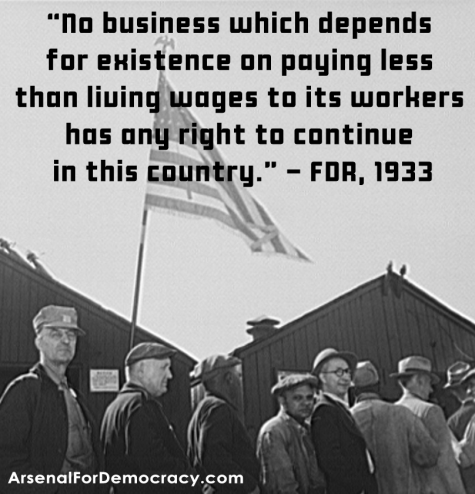This essay was originally published in The Globalist.

What can governments do for incomes in an era of intense global labor competition and automation?
Whose duty is it to ensure a living wage in a global economy where jobs can be moved easily to more “flexible” jurisdictions? And how is that goal of a living wage best achieved, regardless of any moral responsibility?
Increasingly, those questions may have two very different answers, as abstract ideals diverge from realistic solutions in the 21st century.
Aging policies
One common policy solution of the 20th century industrialized world was legal compensation floors, mainly hourly minimum wage laws. Companies were simply compelled to meet their duty to workers.
The first country to authorize a government role in setting minimum wages was New Zealand in 1894. The United States saw its first state minimum authorized in 1912, just over a century ago.
Franklin D. Roosevelt, the U.S.’s 32nd President and the leader of America’s New Deal, in 1933 explained the principle behind such mandates:
It seems to me to be equally plain that no business which depends for existence on paying less than living wages to its workers has any right to continue in this country.
In 1933, that statement was not just a moral argument, but also an enforceable policy position. Today, in many cases, it is not.
No enforceability
Large multinational corporations that operate worldwide have more leverage and flexibility in the global marketplace than any single national government. Their transnational character allows them to avoid national efforts to compel them to do their fair share under a more democratic capitalism.
In many sectors, if a large business has – in the words of Roosevelt – no “right to continue [operating] in this country” due to its preference for paying sub-living wages, it can and will simply go elsewhere.
The century-old mechanism of a legal wage minimum — while still critical — is losing its effectiveness against poverty and labor abuses due to the radical transformation of the global economy. New mechanisms are now urgently required to supplement it.
The underlying goal – the need for a living wage – that once led to the creation of minimum wages have not changed – but the toolbox must expand.
Until lately, the issue has stalled. In most of the industrialized world, strong social safety nets often reduced the perceived need for higher wages. Meanwhile, U.S. activists were tarred as closet socialists seeking the Europeanification of free-market America.
Everywhere, the poor typically lack political leverage. Their demands are frequently written off as ignorant populism detached from economic realities.
Tipping point
But we have reached a tipping point. Even techno-optimists – those who have long boosted the life-easing benefits of the arrival of robots – are now concerned.
They are starting to acknowledge that the pressure on wage levels (and employment levels themselves) will no longer just come from cheap, surplus human labor overseas. It will also come from increased mechanization, automation and robotics.
And this time, the pressure will affect (and is already starting to affect) workers with higher incomes, too.
It is as if President Roosevelt foresaw all of this. As he put it in his 1933 speech on the necessity for minimum wage mandates: “By workers, I mean all workers, the white collar class as well as the men in overalls.”
While the latter have often been politically weak, the voters of the “white collar class” tend to be the primary field of competition for most major political parties in advanced democracies.
With their jobs and wages increasingly at risk, too, the problem will be much harder for governments to ignore.
New solutions
If (and since) corporations are unlikely to do their part in a footloose global labor market, governments may have no other choice but to come up with the money and systems to subsidize employment and/or incomes (regardless of employment status).
Job creation subsidies in the U.S. have become widespread. Already, Germany has expanded subsidies for employers during downturns to maintain staffing levels at reduced hours but normal pay. Some U.S. states are testing similar ideas.
Thomas Paine’s Dividend: An Idea Whose Time Has Come
A Globalist Paper by Brent Ranalli
Bolder strategies may become necessary simply to keep people occupied, fed and housed. That might even mean providing minimum income supports to freelancers and artisans, as well as various other strategies that seem inconceivable to many now.
Emerging labor markets
The issue is by no means a “first-world problem.” Globalized interconnectedness and technological advances have already delivered many workforce challenges from the older advanced economies to newly-industrialized countries.
These economies are facing this well before they have even settled into their new, middle-income or threshold high-income statuses.
From Latin America to Asia, governments are confronted with a simple reality. Mega-corporations simply move (or automate) production when wages are set above their preferred level.
Recently, during a tense farm labor dispute, Mexican federal government even briefly considered paying the difference between a minimum and living wage. Ultimately, this unprecedented proposal was abandoned.
Still, similar ideas are bound to resurface elsewhere, as wages and employment figures reach a crisis even outside of recessions. New approaches to the realities of the 21st century economy are now inevitable.
Funding them fairly will be a hurdle too, of course. Tax avoidance among high-earners, like offshoring, is another costly jurisdictional hopscotch game plaguing globalization today.
Experimental remedies from unexpected places that seem far-fetched now may become global fixtures. Just as New Zealand’s curious minimum wage law in 1894 once did.


